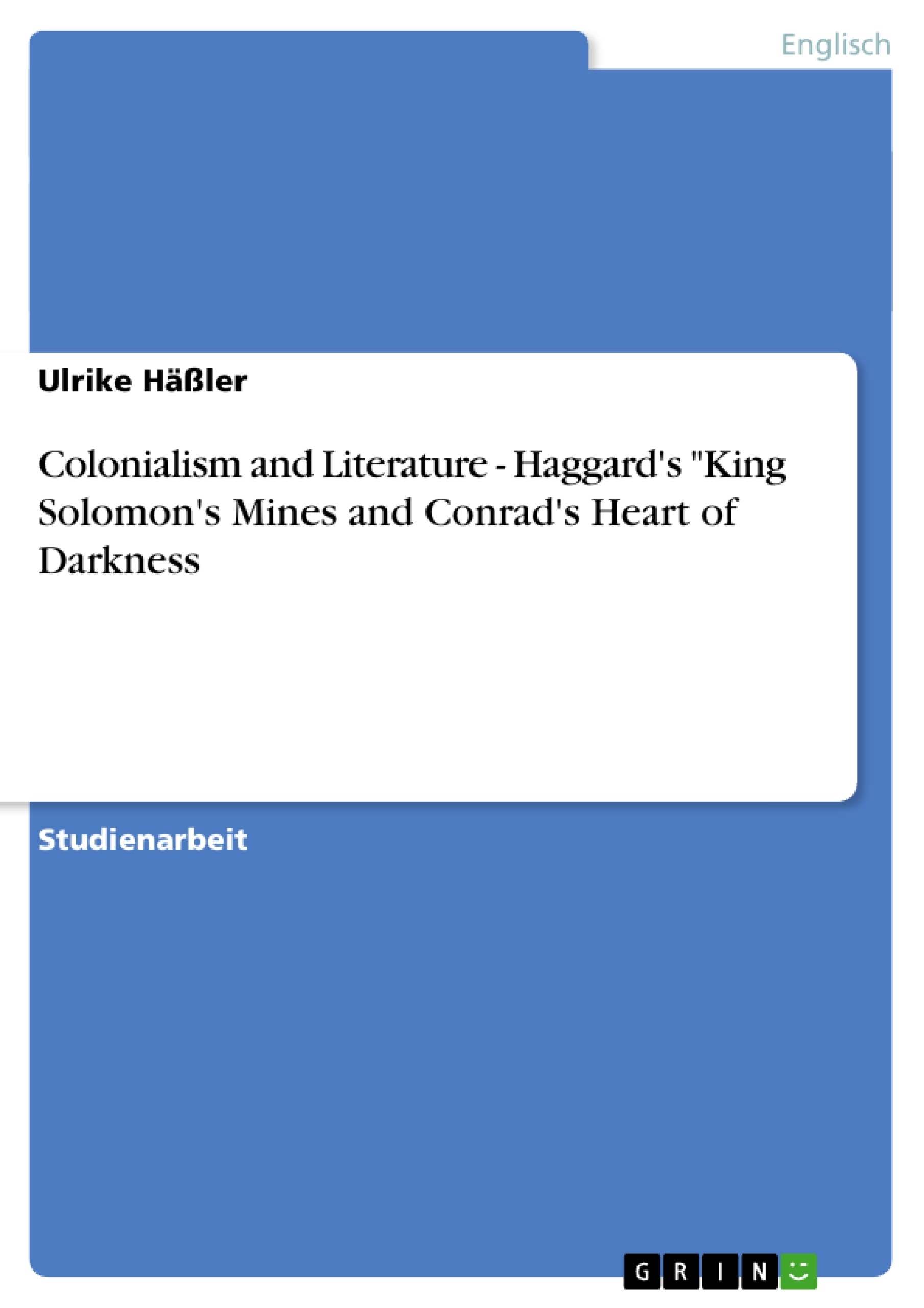[...] Lots of authors reflected in their literary works the nation’s concepts and development in various ways having in mind different
aims the final piece of art was meant to achieve. Joseph Conrad’s novella Heart of Darkness, published in 1902, expresses a changed attitude toward the British empire and its ideological ambitions after a general enthusiasm which finds its expression in imperial novels such as H.Rider Haggard’s Solomon’s Mines, published in 1885. Criticism started to gain ground and although a radical and direct opposition could not yet be found, a questioning and distancing from society’s conventions was obvious. The late Victorian period is seen as the golden age, but also taking into account the following Edwardian period, its description as an age of crisis cannot be considered to be false. The empire had achieved the biggest expansion and colonies were economically exploited to maintain Britain’s status as leading power. However, the nation was more and more confronted with rival European colonial powers an had to deal with an intensified competition for markets and raw materials. Apart from this threat from outside, England was concerned with problems within the nation caused by the rapid growth of industry and fractured class relations which seemed to be unbridgeable. Poverty was a present fact especially in London and were discussions about its conditions and the deprivation among the working class. Lots of people lived in slums and their living conditions were even compared to those of slaves. Both authors had had experiences as a part of British Empire in African colonies, a fact which influenced the realisation of their works. Haggard spent part of his life in South Africa and his novel King Solomon’s Mines can be clearly described as an adventure story and, more important, as an imperial romance. It contains distinctive features underlining the empire’s ideological framework. Conrad’s novella which followed almost two decades later, differs to that in a lot of aspects, which is first and foremost due to a new development in the English society and the formation of the modernist movement. His work had a great influence on artists even several decades after its publication and describes a decisive subject of literary criticism.
Inhaltsverzeichnis
- Introduction
- H.Rider Haggard's King Solomon's Mines
- Narrative
- Audience
- Gender and Sexuality
- Colonial Discourse
- Joseph Conrad's Heart of Darkness
- Conrad and Modernism
- The Idea of Empire
- Narrative
- Impressionism and Symbolism
- Landscape
- Language
- Criticism
- Achebe
- Gender, Sexuality and Feminist Criticism
- Influence
- T.S.Eliot
- Coppula's Apocalypse Now
Zielsetzung und Themenschwerpunkte
Diese Arbeit untersucht den Einfluss des britischen Kolonialismus auf die englische Literatur des späten 19. und frühen 20. Jahrhunderts anhand der Werke "King Solomon's Mines" von H. Rider Haggard und "Heart of Darkness" von Joseph Conrad. Sie beleuchtet die Entwicklung des imperialen Diskurses in der Literatur und die damit verbundenen Ideologien, insbesondere die Darstellung von Rasse, Geschlecht und Macht.
- Die Darstellung des britischen Kolonialismus in der Literatur
- Die Rolle von Rasse und Geschlecht im imperialen Diskurs
- Die Entwicklung des Modernismus in der englischen Literatur
- Der Einfluss von Kolonialismus auf die englische Gesellschaft und Kultur
- Die Kritik an den Ideologien des Imperialismus
Zusammenfassung der Kapitel
H.Rider Haggard's King Solomon's Mines
Dieses Kapitel analysiert Haggard's "King Solomon's Mines" als typischen Vertreter des imperialen Romans. Die Handlung, die sich auf die Suche nach einer verlorenen Diamantenmine konzentriert, dient als Vehikel, um die Ideale und Werte des Britischen Empire zu präsentieren. Die Europäer in der Geschichte werden als überlegen dargestellt, während die afrikanischen Einheimischen als primitiv und rückständig charakterisiert werden. Die Geschichte dient dazu, die moralische und kulturelle Überlegenheit des britischen Imperialismus zu rechtfertigen.
Joseph Conrad's Heart of Darkness
Dieses Kapitel konzentriert sich auf Conrads "Heart of Darkness" und untersucht, wie es sich von den traditionellen imperialen Romanen unterscheidet. Das Werk spiegelt den beginnenden Wandel in der Einstellung zum Britischen Empire wider und hinterfragt dessen Ideologien kritisch. Der Roman erforscht die dunkelsten Seiten des Kolonialismus und die zerstörerischen Auswirkungen der europäischen Macht auf die afrikanische Kultur.
Schlüsselwörter
Kolonialismus, Imperialismus, Literatur, englische Literatur, H. Rider Haggard, Joseph Conrad, "King Solomon's Mines", "Heart of Darkness", Rasse, Geschlecht, Macht, Modernismus, Kritik, Afrika, Imperialer Roman
Häufig gestellte Fragen
Wie wird der Kolonialismus in "King Solomon's Mines" dargestellt?
H. Rider Haggard stellt den britischen Imperialismus als moralisch und kulturell überlegen dar, wobei Afrika als Abenteuerkulisse für europäische Helden dient.
Was unterscheidet Conrads "Heart of Darkness" von Haggards Werk?
Während Haggard den Empire-Gedanken feiert, hinterfragt Joseph Conrad die Ideologien des Kolonialismus kritisch und zeigt dessen zerstörerische Wirkung auf Mensch und Kultur.
Welche Rolle spielt die Rasse im imperialen Roman?
In diesen Werken wird Rasse oft als Rechtfertigung für Machtstrukturen genutzt, wobei Einheimische häufig als "primitiv" im Gegensatz zum "zivilisierten" Europäer gezeichnet werden.
Wie beeinflusste der Modernismus Joseph Conrads Schreibstil?
Conrad nutzt impressionistische Techniken und Symbole, um die Unsicherheit und moralische Komplexität des menschlichen Geistes in der Wildnis darzustellen.
Was ist die zentrale Kritik von Chinua Achebe an "Heart of Darkness"?
Achebe kritisiert Conrads Werk als rassistisch, da es Afrika lediglich als dunkles Spiegelbild zur europäischen Psyche nutzt und den Afrikanern keine eigene Stimme gibt.
- Citation du texte
- Ulrike Häßler (Auteur), 2003, Colonialism and Literature - Haggard's "King Solomon's Mines and Conrad's Heart of Darkness, Munich, GRIN Verlag, https://www.grin.com/document/39223



